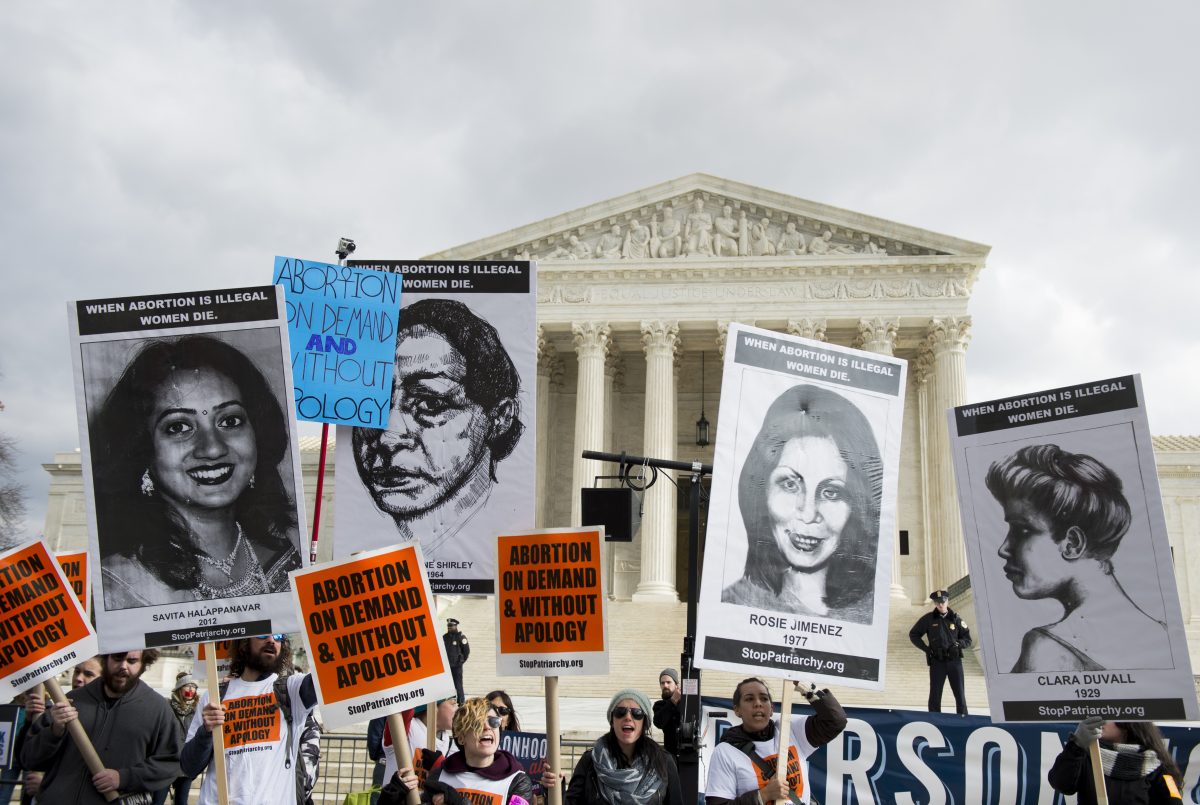
Source: Bill Clark / Getty
Forty-nine years ago, a decision in the Supreme Court case known as Roe V. Wade was issued; the prohibition of abortion by states was deemed unconstitutional. The 14th amendment, or Right to Privacy was cited and the decision was hailed as a landmark, a harbinger of even more progress to come.
However, almost 50 years since that verdict, abortion rights are hanging on by a thread in many states, and our Supreme Court stands on the precipice of overturning the decision. It is a crucial time for abortion rights. This fact is even more distressing when you consider that as late as last June, the Supreme Court was affirming the constitutional right to abortion. The catalyst in the changes that we are witnessing come down to the composition of the Court. Fifty years of lobbying by Right-Wing Evangelical organizations have culminated in the reality that we are facing today.
Currently, only 90 percent of counties in the U.S. have an abortion clinic, and five states are down to one clinic. As of 2017, Louisiana was down to four clinics that provided the service, leaving 94 percent of counties in the state without a clinic. Additionally, this year saw challenges to Lousiana’s Judicial Bypass Law (Act 482), an act that provides minors with the option of seeking legal permission from courts to seek an abortion when their legal guardians don’t provide it. Prior to the passage of Louisiana Act 482, minors did not have to file for judicial bypass in their counties of residence. Now, they are required to.
Communities in the South and Midwest are already bearing the brunt of extremely restrictive abortion laws. Furthermore, the impact of abortion restrictions and bans fall hardest on people who already face discriminatory obstacles to health care; especially Black women.
The threat to the right to have an abortion is not merely a threat to white women, and the dialogue needs to shift and encompass not only the procedure of abortion, but also contraceptives, sexual violence, and reproductive health education. In 2008, 69 percent of all pregnancies among Black women were unintended, a number that proper access to contraception and reproductive health education could help reduce.
In 2014, Black women had 36 percent of all abortion procedures in the US, despite only making up around 13 percent of the population. Research has shown that this statistic has much to do with the fact that Black women have higher rates of unintended pregnancies than their white and Hispanic counterparts; abortion is often the last defense that Black women have in terms of contraception. Considering the fact that most women cite economic difficulties for their decision to terminate their pregnancies, eliminating the right to abortion would result in unfortunate circumstances for many of these women, especially Black women.
In September of 2021, a law banning abortions after 6 weeks was passed in neighboring Texas. The Supreme Court declined to block the case, and so the legislation was able to take effect. Additionally, the law, quite extraordinarily, grants private citizens the right to sue those who provide abortion access and if successful, collect a reward of 10,000 as well as the cost of their legal fees, from the defendants. As soon as the law went into effect, it shut down almost all clinics in the state, as they were afraid to get sued. A few weeks after the law went into place, the Justice Department issued an injunction that enabled some clinics to start operations again, however just a few weeks ago the 5th Circuit Court of Appeals sent a challenge to the Texas State Supreme Court, which may delay the removal of the law for many months to come. Meanwhile, a Mississippi law banning abortion after 15 weeks, has been taken to the Supreme Court and may not be ruled upon until June of this year. However, preliminary reports contend that the court is leaning towards upholding the law (Hassan, 2021).
As a young, Black woman of reproductive age attending university in Louisiana, a state experiencing its own challenges to abortion access, surrounded by others even closer to removing access entirely, it is distressing to see the quickness with which this fundamental right is being eroded. Even more so to see the Supreme Court tacitly allowing it. It is frustrating to see laws being passed, with no resistance from the politicians who claim to protect our interests, and feel our voices as a collective fade further and further into the background. Abortion has been a crucial option for so many; I’ve held witness in my own life. Countless stories of young women whose lives would have been dramatically altered without the choice circulate throughout my life, my friends’ lives, our families’ lives. These choices alter the trajectory of generations, and without it many will find their lives irreparably changed.
Roe v. Wade must be upheld by any means necessary, and it’s time to make our voices heard. Abortion is a critical way for Black women to exercise what little agency we have in this country, and to take away that right is a attack on all women, especially those who hold identities in other marginalized groups. Not only do the conversations around abortion need to change, but so do those in charge of the dialogue. We must begin to have inclusive conversations that circle around access to contraception, comprehensive health education and sexual violence. We must demand that our government works in our best interests, rather than fighting us at every turn. Time and time again Black women have led the charge for liberation, but the onus is on us no longer, we must be the ones who are fought for.









